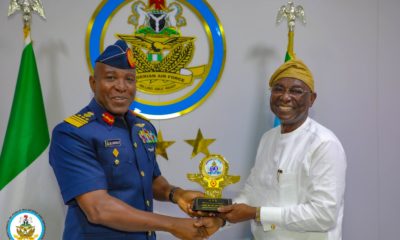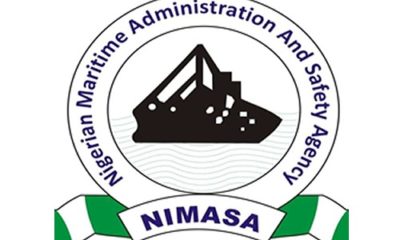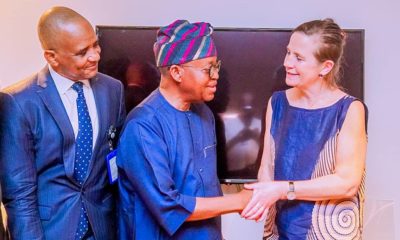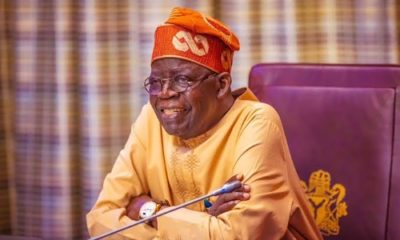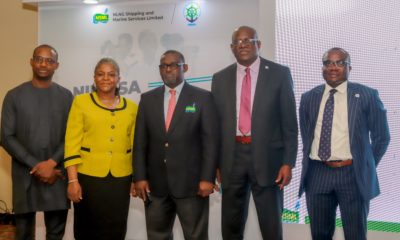Business
Shipping: Nigeria Can Drive African Blue Economy
The huge potentials of the African continent’s blue economy can only be unlocked with Nigeria’s active participation.
The Deputy Minister for Overseas Koreans and Consular Affairs, Republic of Korea, Choi Yeong, made the assertion in a statement issued by Assistant Director, Public Relations, Nigerian Maritime Administration and Safety Agency (NIMASA), Osagie Edward, on Tuesday.
According to Edward, Yeong gave the indication during a courtesy visit to NIMASA management in Lagos, led by the Korean Ambassador to Nigeria, Kim Young Chae.
Biztellers reports that blue economy is the sustainable use of ocean resources for economic growth, improved livelihoods, and jobs creation, while preserving the health of the ocean ecosystem.
As an example, Yeong commended the sustained and improved security situation in the Gulf of Guinea with the strong presence of Nigeria.
He added that the Korean government looked forward to continuous support from the Nigerian government in the area of intelligence and information sharing.
In his words, “Nigeria is one of the biggest countries on the African continent in terms of economic size, population and market potential. So, Nigeria can be an essential partner to us, the People of Korea.
“Nigeria can be our gateway to the whole of the African continent. We are glad to inform you that Korea has scheduled a summit involving the entire African continent in 2024 and hope it will strengthen the relationship with Nigeria and Africa.”
On his part, Director-General, NIMASA, Dr Bashir Jamoh, noted that the relationship between both countries dated over 40 years, and therefore a need to deepen it further.
Jamoh identified Korea as a foremost maritime country with highly recognised capacity in ship building and ship repairs, adding that Nigeria was willing to partner with Korea in shipbuilding for the short-, medium- and long-term benefits of both countries.
“There is no how the issue of trade can flourish without adequate security.
“NIMASA is making steady progress in collaboration with the Nigerian Navy and other security agencies to secure the safety and security of investors, vessels, and seafarers in the Nigerian maritime domain.
“Considering the fact that the population of Koreans is highest in Nigeria when compared to other African states, the need for an improved relationship between Nigeria and Korea cannot be over-emphasised.
“Korea has arguably the best ship building companies, globally, and that is an area we desire partnership.
“We have commenced discussions with the Samsung Group and Hyundai as well on the issue of shipbuilding and ship repairs,” Jamoh said.
On piracy issues in the Gulf of Guinea, the NIMASA boss pointed out that since the 2nd quarter of 2021, there had been no issues of kidnapping and insecurity.
He assured the visitors that the Federal Government was determined to achieve a safe and secured maritime domain in Nigeria, noting that the time to improve the Korean-Nigerian bilateral relationship, particularly in the fishing sector, was now.
“I believe we can also explore improved interphase in areas such as deep-sea fishing. Fishing in Nigeria used to be a very large source of income, not far behind oil and gas.
“The numbers are not looking very encouraging at the moment. Partnership will lead to more fishing trawlers in Nigerian waters,” he said.
Yeong and his team members visited the Beep Blue C4i Center, located in the NIMASA Nigerian Maritime Resource Development Centre (NMRDC) in Kirikiri, NIMASA e-Library, the Marine Environment Management Laboratory and the Kitack Lim Regional Maritime Safety and Security Centre of Excellence.
Business
Savannah Energy Provides Unaudited FY 2024 Trading Updates

Savannah Energy has shared a trading update on its Nigerian operations and other markets in Africa, including up-to-date cash collections in its Nigerian business.
According to the update, made available on Thursday in Lagos, its gross production in Nigeria averaged 23.1 Kboepd for FY 2024, broadly in line with the prior year’s 23.6 Kboepd, of which 88% was gas (FY 2023: 91%).
On the update, CEO of Savannah Energy, Andrew Knott, said, “I am pleased to provide a FY trading update which demonstrates the continued progress we have made in 2024, a year which saw the highest level of cash collections ever recorded by our Nigerian business. 2025 is expected to be an exciting year for our Company: we have a large planned operational programme in Nigeria which is anticipated to enhance both our oil and gas production levels and capacity; we intend to progress our R3 East oil development project in Niger; we continue to pursue key acquisitions in the upstream oil and gas space; and we continue to seek to build our power business.
“Fundamentally, Savannah remains unequivocally an “AND” company, seeking to deliver strong performance both for the short AND long term across multiple fronts, and pursuing growth opportunities in both the hydrocarbon AND power sectors.”
The update It also shows that it generated a Total Income of US$393.6 million in 2024, compared to FY 2023’s US$289.8 million. This consists of Total Revenues of US$258.7 million and Other operating income of US$134.9 million.
The report also shows that Savannah’s FY 2024 Total Revenues were ahead of the previously issued financial guidance of greater than US$245 million, while FY 2024 financial guidance is reiterated for Operating expenses plus administrative expenses at ‘up to US$75 million’. The company expects its FY 2024 capital expenditure to come in lower than planned (previously guided at ‘up to US$50 million’) due to the phasing of spend.
ALSO READ: CSR: Dangote Awards Scholarships To 473 Students
According to the update, Savannah’s cash collections in 2024 amounted to US$248.5 million, a slight increase from the US$206 million it received in 2023. The report further shows that its cash balances as at 31 December 2024 stood at US$32.6 million, compared to the 31 December 2023 figure of US$107.0 million.
The report shows that the company’s midstream subsidiary, Accugas Limited, had as at 31 December 2024 drawn down on its NGN332 billion of the NGN Transitional Facility, with the resulting funds being converted to US$, which, along with cash held, was used to partially prepay the existing Accugas US$ Facility, leaving a balance as at 31 December 2024 of approximately US$212.3 million.
The report also provided new updates on Accugas’ US$45 million Uquo Central Processing Facility (“Uquo CPF”) compression project in Nigeria, noting that its commissioning which will enable the expansion of gas production in the medium term is well underway.
The report highlighted the progress being made in the procurement process of long lead equipment in Nigeria for a potential two-well drilling campaign on the Uquo Field in H2 2025, with an additional gas development well expected to add up to 80 MMscfpd of supplemental production capacity and a potential exploration well targeting an Unrisked Gross gas initially in place (“GIIP”) of 154 Bscf (25.7 MMboe) of incremental gas resources.
The update shows that progress is also being made in the planned Savannah acquisition of Sinopec International Petroleum Exploration and Production Company Nigeria Limited, whose principal asset is a 49% non-operated interest in the Stubb Creek oil and gas field (“Stubb Creek”), with regulatory approval and completion being targeted in Q1 2025. Following the completion of the acquisition, Savannah intends to commence an expansion programme which is anticipated to increase Stubb Creek gross production from an average of 2.7 Kbopd in 2024 to approximately 4.7 Kbopd.
In Niger, Savannah continues to seek to progress its 35 MMstb (Gross 2C Resources) R3 East oil development in South-East Niger, while it continues to push for a potential alternative transaction structure to acquire a material stake in producing oil and gas assets in South Sudan as previously announced on 20 December 2024.
On the renewable energy front, the update shows that Savannah has up to 696 MW of renewable energy projects currently in motion, including the up to 250 MW Parc Eolien de la Tarka wind farm project in Niger and the up to 95 MW Bini a Warak hybrid hydroelectric and solar project in Cameroon. A firm believer in Africa’s transition to renewable energy, Savannah continues to target a portfolio of up to 2 GW+ of power projects in motion by the end of 2026.
Business
Nigeria Can Achieve 5.5% GDP Growth – NESG
The Nigerian Economic Summit Group (NESG) has projected that the country has the potential to achieve a 5.5% growth in Gross Domestic Product (GDP) if critical policy reforms are sustained.
This was disclosed on Thursday during the launch of the NESG’s 2025 Macroeconomic Outlook report.
Speaking at the event, the Chief Economist and Director of Research & Development at NESG, Dr. Olusegun Omisakin, highlighted the need for more efficient policy implementation to unlock Nigeria’s economic potential.
READ MORE: Davido Is Richer Than His Billionaire Father – Ibrahim Chatta Claims
“We believe at the optimal level, if we embark on more efficient policy reforms, the Nigerian economy has the potential, the GDP to end up at 5.5 per cent, and we believe that this is achievable,” Omisakin stated.
More to follow……….
Business
CBN Approves Release Of Nigerian FX Code
The Central Bank of Nigeria (CBN) has announced the release of the Nigerian Foreign Exchange (FX) Code, a set of guidelines designed to promote ethical conduct among authorized dealers in the country’s FX market.
In a statement, the apex bank disclosed that the official launch of the Code would take place on Tuesday, January 28, 2025, at the CBN Head Office Auditorium in Abuja.
READ MORE: Dangote Denies Culpability In Pumping Up Petrol Price
“The Central Bank of Nigeria has approved the release of the Nigerian Foreign Exchange (FX) Code as a guideline to the banking industry to promote the ethical conduct of authorised dealers in the Nigerian Foreign Exchange Market,” the statement read.
The introduction of the FX Code is expected to enhance transparency, accountability, and professionalism within Nigeria’s foreign exchange ecosystem, aligning it with global best practices.
The event is anticipated to attract key stakeholders in the financial and banking sectors, as well as representatives from authorized FX-dealing institutions across the country.

